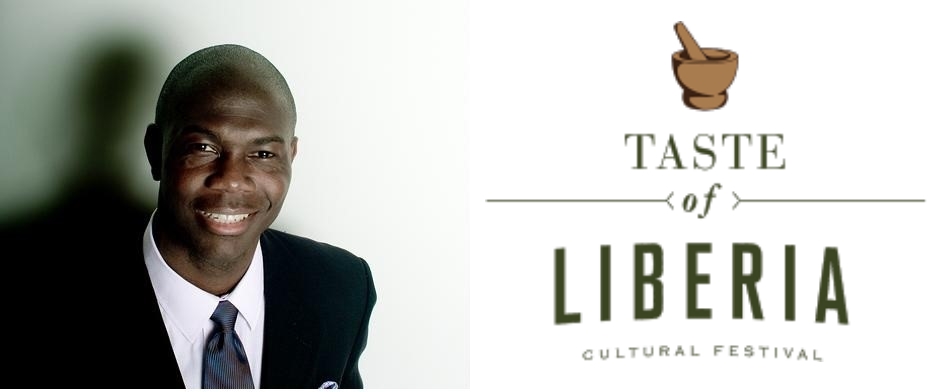The “Liberian Trailblazers†series profiles exceptional Liberians and the work they do. The Bush Chicken recently spoke with Nathan White, Executive Director of Taste of Liberia Cultural Festival taking place in Minneapolis, Minnesota. In celebration of Liberia’s 168th Independence Day, White is launching the inaugural event which will occur annually between July 4th and July 26th.
Tell us about your background and professional experience.
I’m originally born and raised in Liberia and like most folks, I left during the war. I went to school for a bit in Nigeria and finally immigrated to the US, where my family was, in 1993.  After leaving, I didn’t go back to Liberia until 2012. I had been gone for about 19 years at that time. Over the years, I traveled to Liberia and Ghana to just see what had been happening on the continent. My professional background is in finance and risk management. I’ve worked for Wells Fargo, US Bank, and TCF Financial.
What was your inspiration for creating the event?
My stepmom passed away last year and when I returned to Liberia to bury her, I became aware of the profound impact she made on the community. She had such an impact on the lives of Liberians over the years that I wanted to do something to commemorate her life and give back in a way that would make a difference. One of the things that I realized during my visit was how much Liberia needed to promote how special of a place it is to the rest of the world. It just so happened that when I returned from the funeral, the initial Ebola virus outbreak occurred and the only news about Liberia were negative facts. I felt like I owed it to my mother to showcase what she loved so much about this place. It was the food, the culture, and the people, and that’s where the idea came from. What differentiates our event from other “Taste of†events is the tie-in with tourism. Our goal is to ultimately get people to visit Liberia and see it for themselves. The first time I returned from my travel to Liberia, my co-workers wanted to see photos of the forest and the animals native to the climate and I realized how interested people were in Liberia with regards to its eco-system. Unfortunately, there’s not much information or resources out there to help guide them towards Liberia’s natural habitat.
Can you elaborate on how your event will differ from other food festivals?
The first purpose is to showcase what’s unique and special about the country and the first way we want to showcase this is by the food. Specifically the food and how it relates to the African-American experience and the Caribbean experience. I’m a descendent of Americo-Liberians and Caribbeans, so I’m exploring everything that makes me unique as a Liberian and letting people know that as an American now, this is what’s so important about this country. So if festival attendees want to know, this is why it’s so important to save Liberia, Liberian history is your history. From the folks who left here to found the nation to the food we eat and the culture that we share, Liberia is very unique. What’s special about Liberian food compared to other African foods is because it shares its history and its uniqueness with the United States and the Caribbean. Secondly, to showcase the country as a tourism destination, exploring and sharing what Liberia has to offer. The forests, eco-tourism potential and a cultural connection for African-Americans who don’t know that Liberia is the most closely connected place in Africa that they can go and trace their roots. This is another way in which we hope to encourage tourism, by helping people understand that they can come back and reconnect with their heritage.
Do you see any opportunity to partner with the Ministry of Information, Cultural Affairs and Tourism in Liberia on some of your tourism endeavors?
Yes, that was always a part of the game plan right off the bat. I went on the Ministry of Information and Tourism website looking for information that I could relay to others. Unfortunately, access to information was non-existent. I spoke with a few folks who indicated to me that President Ellen Johnson Sirleaf is developing a tourism bureau, so I reached out to a few people with regards to creating a partnership. Unfortunately, due to the fact that the country was in the middle of battling the Ebola epidemic, that’s where all of the government’s resources were focused on. But yes, that was always our plan to work with the government to help promote travel to Liberia. There are some eco-tourism attractions popping up around the country so we definitely want to look for those kinds of partnerships to help get the word out. In Minnesota, some of the large chain grocers have recently started selling Liberian food products because of the demand. In response, we want to work with people to develop partnerships on importing some of these goods to areas of the country with high Liberian populations. This is another way to grant larger audiences exposure to our culture and heritage.
How have you marketed the event to non-Africans? Why or how will other people not directly related to the culture find out about the event?
We have a full approach for our marketing campaign and in fact, one of the larger news outlets locally in Minnesota has expressed interest in doing a profile piece for the event. We have also distributed press releases to help get the word out. We’re also hosting a taste-off event which will be judged by a high profile Hispanic celebrity TV chef. We’re definitely not doing things in a way that may be expected by many Liberians. In order to appeal to a wider audience, we’ve intentionally broadened the event in a way that anyone can understand what we’re doing and hopefully want to participate. We’ve also tied the event to a humanitarian effort where we locate Ebola orphans and hopefully raise funds for those directly affected. We’re hosting an awards ceremony to recognize some of the American organizations like Global Health Ministries and Minnesota African Task Force which will hopefully encourage others to attend as well.
How can cooks, restaurateurs, and vendors get in touch with you to participate in the cooking contest?
A simple email to info@tasteofliberia.com or you can visit the website and complete the contact form. We have five judging categories: cornbread, Jollof rice, collard greens, a traditional Liberian dish, and a nouvelle (new and innovative) dish. We are inviting everyone to bring their versions of each of these dishes and we’re having the media at the event to profile the contest. We also have a full line-up of cultural dancers and live entertainment in addition to showcasing some of the work we’re doing in Liberia. Hopefully this event will be a call to action to some folks who never really took the time to see what was going and this can be a platform to recognize people who are doing great things in the country.
Recently New York hosted the first ever African Restaurant Week. How would you be able to adapt the Taste of Liberia event to have a larger scope or a longer event?
Our first event was July 4 weekend and the event continues from America’s Independence Day to Liberia’s Independence Day, July 26, and tying the two shared heritages from the culture to the food. So the long-term goal is to have events going on in between that period where we’re giving people the opportunity to attend a variety of bridge events to commemorate both countries’ Independence Days. In the future it would be great to be able to send the winner of the Taste of Liberia cooking contest to New York to participate and showcase Liberian cuisine. We’ve also discussed facilitating a tour across the US in the cities with the highest Liberian populations to continue showcasing talent and culture.
How receptive have Liberians been to the Taste of Liberia event?
Well, we’ve tried to really be innovative with this event which may be a little different from what people traditionally do for Liberian Independence Day. I understand it may take a few years for people to warm up to the idea that what we’re offering is an opportunity to change the image of our country and expose our culture to the broader population. The good news is we’re in it for the long haul and I think that the way in which we are presenting the event will allow it to grow into a successful endeavor in the long run.
Where would you like to see the event in the next 5 years?
I would like to see the event as large as the Taste of Chicago event and eventually taking place on the ground in Liberia for July 26. Also we’d really like to start developing the Liberian culinary presence on a professional level in US and make it a more marketable product. We hope to expose the agricultural parts of Liberia and bring in investments in the food industry to make the country more self-sufficient in food production. We’d like it to be an event where it starts in the US and people are actually travelling to Liberia for July 26 to experience the Taste. We would like to see people bringing in those tourism dollars and connecting with their heritage to help boost the state of the economy and connect with their roots.
What else would you like to tell our readers and any potential festival attendees who are considering attending the Taste of Liberia?
Definitely visit www.tasteofliberia.com  email us at info@tasteofliberia.com or our Facebook page. What I want to relay most to your readers is that this event is about love of where you’re from, love of country. I experience that when I travel to other African countries and they can’t wait to tell others about where they’re from and they’ve branded themselves in such a way that African-Americans are flocking there. People don’t even know that there’s a country almost right next door to Ghana that they probably have more of an affinity with. But there hasn’t been a properly branded message to convey that and that’s what we hope they’ll get when they come to the Taste of Liberia.



